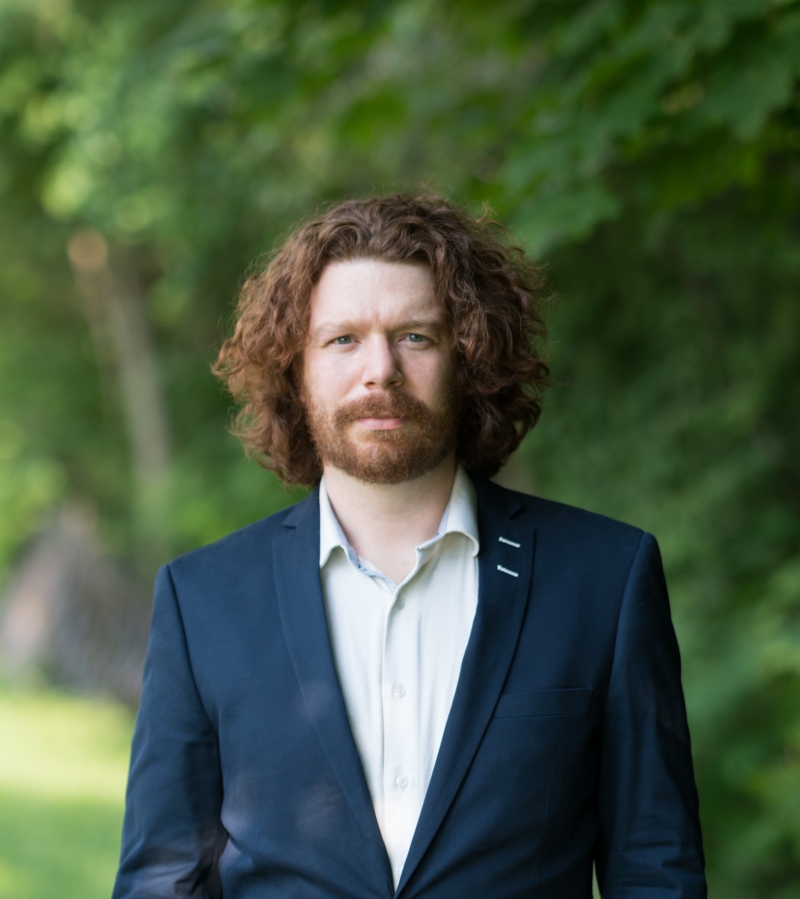
Alumnus explores the relationship between art and commerce in daring new novel
 "You could float forever in this country; if you were careful where you looked, no one would ever pull you to the ground."
– André Forget, In the City of Pigs
"You could float forever in this country; if you were careful where you looked, no one would ever pull you to the ground."
– André Forget, In the City of Pigs
In 2017, André Forget was asked by friend and collaborator Joel Peters (CMU, 2011) to write a short story about a fictitious underwater organ. The only rule was to keep the story around 2,000 words. Forget ended up writing a 10,000-word academic dissertation about the mythical instrument, which he named the hydroöganon. Complete with invented scholars debating each other's theses and extensive details as to the engineering of the instrument, the story, originally titled The Lower Registers, served as the impetus for writing his debut novel In the City of Pigs, published by Dundurn Press in the summer of 2022.
Forget, who graduated from Canadian Mennonite University (CMU) in 2010, is well-traveled and is currently living in England. His experiences moving across the globe reflect his thoughtful, multilayered writing and stories. Much of this is explored in In the City of Pigs.
The novel follows Alexander Otkazov, a classical pianist who, fed up with the pressures of his industry, leaves his life in Montréal behind and moves to Toronto. He wastes his days away oscillating between daily trips to bars and serving food part-time at an upscale brunch lounge to the city's aristocracy. Despite being intentionally lost in a limbo of self-destruction, Alexander comes across a story of an experimental music collective that launches his career as a journalist and takes him through the world of shadowy real estate deals, finance capitalism, and where art is a subterfuge for private enterprise.
"This idea that is a bass note in culture, this idea that art is somehow a pure arena for free expression and playing with ideas is nice; but the money has to come from somewhere," says Forget. "The arts are enlisted in that process of [real estate] development."
"[Developers] make obscene amounts of money doing quite dodgy things, and then they turn around and give some of that money to Roy Thomson Hall—it's a strange interconnection," says Forget.
Being relatively conversant with the city's heavily inflated housing market and the conditions of development, Forget says, "Over the past 10 years, the experience of living in Toronto has been an experience in seeing stuff torn down and new buildings put up," says Forget. "But people need the units; people do need to live somewhere. Tearing something down and building something that has 10 times the living space is not completely a bad thing."
These ideas of modernization and advancement ultimately led Forget to the significant concepts within In the City of Pigs. "Progress and artistic styles are a big part of the novel. These ideas of what does it mean to make something new? Are we just retreading the past? Those seem to be in parallel with the idea of what to do with the state. Do you make a new city, do you renovate it, or do you try to preserve something?" says Forget.
Before writing In the City of Pigs, Forget worked as editor-in-chief of the Puritan, a literary journal that publishes fiction, essays, and interviews. His writing has also appeared in The Walrus, The Globe and Mail, and Canadian Notes & Queries, among others. But before those lofty accomplishments, Forget says his time at CMU allowed him to explore his creative aspirations. "I've always been interested in literature, but I was also interested in philosophy and theory. So, part of the appeal of CMU was that it was a place that encouraged that raw [curiosity]," says Forget.
One of those classes, which Forget says was particularly helpful, was a course called Revenge, taught by Professor of English Paul Dyck. This class explores the cultural and theological meanings of revenge through various literary forms, including drama, narrative, poetry, and film.
Dyck says, "The conversations we have in that class are charged with feeling in an unusually vivid way. I think the approach of using both Shakespearean drama and contemporary film, along with other genres, breaks through the pious fog we put around literature and makes it real. So now you're reading Hamlet with Kill Bill in mind and asking why it matters."
"The [Revenge] course did exactly what CMU does well," says Forget. "It takes all of these different books with a central theme and has fun with it."
Dyck says he's thoroughly enjoyed reading In the City of Pigs; "It's an amazing feeling to pick up the book of not only a friend but a student and find that it's brilliant.
Purchase your copy of In the CIty of Pigs from Dundurn Press or McNally Robinson Booksellers.
Printed from: media.cmu.ca/alumni-andre-forget-explores-art-and-commerce-in-new-novel
